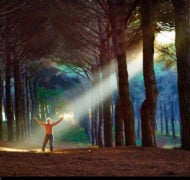Jubilee: Creation Is a Manifesto
Blog / Produced by The High Calling
We Christians sometimes try to be holier than God, especially when it comes to creation. We act as if the world is under the sway of the evil one. We get our escape pods ready, eager to abandon creation, convinced God doesn’t care about it either.
But that’s hardly God’s take on creation.
We Christians sometimes try to be holier than God, especially when it comes to creation. We act as if the world is under the sway of the evil one. And we get our escape pods ready, practically eager to abandon creation, convinced that God doesn’t really care about it either.
But that’s hardly God’s take on creation. Indeed, in the Incarnation, the Word made flesh, the Creator of the universe moves into our neighborhood. The infinite, transcendent God becomes embodied like us. And did you notice how the whole Story ends in Revelation 21? God doesn’t eject us from creation; he comes down to dwell with us in a new creation. So the Story ends where it began: creation is very good.
That’s why everything matters.
The doctrine of creation is more than a statement of what the cosmos is. The biblical teaching on creation is a manifesto, a mission, a commission that sends us into God’s good but broken world with a calling. I want to summarize this (co)mission in three verbs: image, unfold, occupy. These are “do” words, action terms. Let me unpack each of these elements in more detail:
1) We are called to image GOD.
We are created in the image of God (Gen. 1:27). But I think it’s important to hear this more as a verb than a noun—as a task and mission rather than a property or characteristic.
The “image of God” (imago Dei) is not some de facto property of homo sapiens. Rather, the image of God is a task, a mission. As Richard Middleton comments in his book, we are commissioned as God’s image bearers, his vice regents, charged with the task of “ruling” and caring for creation, which includes the task of cultivating it, unfolding and unfurling its latent possibilities through human-making—in short, through culture. “Imaging God,” Middleton points out, “thus involves representing and perhaps extending in some way God’s rule on earth through ordinary communal practices of human sociocultural life.”
Do you know what that means? We image God in our work—in all of the very earthly things we are called to do.
2) We are called to unfold POTENTIAL.
Notice in Gen. 1:28-30 that our task as image-bearers is to be fruitful and multiply (the fun part!), to “cultivate” the earth, and to “have dominion” over creation.
Creation is very good; but that doesn’t mean that it is complete. Creation doesn’t come into existence with schools and art museums and iPhones and automobiles. God places us in creation and commissions us to unpack and unfurl all of the latent potential that God has folded into creation. As Tolkien puts it, we are “sub-creators.”
This doesn’t mean we can create whatever we want, however we want. God shows us what “good unfolding” looks like in the biblical vision of that coming city. In other words, the consummation of God’s story in Scripture reveals to us what God wants for his creation—the shalom and flourishing that are painted in those Scriptural pictures of the kingdom.
That’s why we need to beware of monsters: our creative impulses turned to Promethean striving. Our cultural creations can outstrip us, even at times when the culture-making impulse is suffused with the best of intentions because culture is not neutral or benign. It is not simply a “good.” More importantly, we need to remember that creation—especially our creations—do something to us.
A biblical theology of creation affirms the goodness of God’s world and the goodness of our culture-making impulse. But it also includes a caution: affirming creation and culture is not synonymous with affirming everything we make. Saying “yes” to economic life, for instance, doesn’t mean I have to say “yes” to unjust economic systems that we have made.
3) We are called to occupy CREATION.
To take up our commission today—to carry out the work of being God’s image-bearers—requires attesting to the fact that something is wrong. We’re not in Kansas anymore. We’re not in the Garden anymore. And so the body of Christ is called to be that peculiar people who “occupy” creation and remind the world it belongs to God.
The body of Christ should be a testimony to the kingdom that is coming, bearing witness to how the world will be otherwise. Our work may sometimes include protest and critique, but our engagement with God’s world is not about running the show or winning a culture war. We are called to be witnesses, not necessarily winners. We are called to what James Davison Hunter has aptly described as “faithful presence.” Faithful presence is how we occupy creation.
This requires being regularly re-centered in the Story. And so we “occupy” creation in that motley tent camp that is the church. Yes, God’s affirmation of the goodness of creation tells us everything matters, and you will learn that over and over again in the church. It is in the worship of the triune God that we are re-stored by being re-storied. The practices of Christian worship “re-narrate” our imagination so we can perceive the world as God’s creation and thus hear his call that echoes within it.
Everything matters. And so he commissions us to tend every nook and cranny of this universe. He is maker of all things, Lord of all things, and redeemer of all things. Imagine what God might be calling you to.
Featured image by Moyan Brenn. Used with Permission. Source via Flickr.





